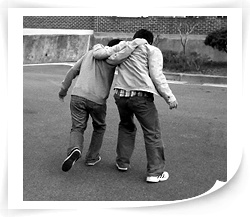The Last One
In this chapter, Primo Levi describes the effects of the transition from “manual laborer” to the laboratory worker who has many advantages over ordinary prisoners. He has much higher living standards and the advantage of stealing tools. The comfortable surroundings of laboratory allowed him to look back at the life, and in looking back, he finds how he had adapted well in this surrounding. He writes about his “strategic” way of living, and within his writing, how he had accumulated all the knowledge to “survive” in the camps are well written. The way how he stole parts of tools that might be a value in laboratory and sold in black market to obtain ration food reflects how much experience he has accumulated to “survive” in the dreadful surroundings of Auschwitz, and the establishment of “Operation File” with Alberto suggests how deep and kin their relationship was. I guess Alberto was kind of a figure, whom Primo Levi depended or relied on, or it could be vise versa. They always shared even the smallest thing they had. The trust that formed between them allowed them to survive in the dreadfulness of the camp where nobody believes anyone, but because each of the existed for Primo Levi and Alberto, they gave strength and hope to one another. The story progresses on and Primo Levi describes one man who tried to revolt in the concentration camp. “The man who is to die in front of us today in some way took part in the revolt...He is to die today before our very eyes: and perhaps the Germans do not understand that this solitary death, this man's death which has been reserved for him, will bring him glory, not infamy." The one man who revolted probably have brought strong emotional appeal to the prisoners in the camp to revolt because he posed a whole different perspective of the meaning of “survival.” He seems to suggest that “survival” in Auschwitz is being subjected under German control, and most prisoners might have felt or agreed with him and felt ashamed, however, I believe there are many different choices that prisoners could make that are wise. The man who chose “revolutionary” way that was willing to give up his life, while Primo Levi and other prisoners chose to “survive” and endure the hardship that Germans might give them, and they reflected their will to go home. It depends on people what choice is good or bad for them, but as for me, I would also have chosen Primo Levi’s way of living. Probably because of the hope that one day if I would get out of this concentration camp, I would taste the freedom and warmth in full appreciation. Thus, nobody could blame on anyone for the choice they have made for their own future.
Monday, March 12, 2007
Subscribe to:
Post Comments (Atom)

No comments:
Post a Comment